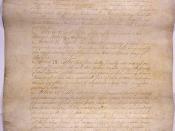When the Continental Congress assembled for a second time in July of 1775 and adopted the Declaration of Independence as their argument and explanation for splitting with Great Britain, one of the major concerns on the delegates' minds was the question: what government would be put in place to replace King George and Parliament (Articles)? The answer was finally put forward by John Dickinson and after two years of debate and revision the Articles of Confederation were ready to be approved (Johnson). The ratification process proved tediously slow however and Maryland, the last holdout, finally agreed to accept it in 1781 (Pageant). During the Revolution and in the peace negotiations directly after America's new government seemed rather effective, leading the former colonies in defeating the Redcoats and successfully negotiating peace terms at the treaty of Paris. This façade of efficient governance was lost however when the central government was unable to unify the American people, provide an effective means of defense against external and internal forces, or effectively rule.
The Articles of Confederation established exactly that, a confederation - a group of empowered states or communities - and in doing so the federal government lost any semblance of real control over the states. The sovereignty given to each individual state led the rise of local and regional allegiance rather than a national identity, when asked what they were for example Americans would respond: "a Virginian" or "a New Yorker", and the concept of being American was unknown (Johnson). This autonomy was quickly taken advantage of by states large and small especially from an economic standpoint, and not long after the war had ended the states began printing their own currency and setting up walls of tariffs up against each other (Articles). These steps drastically reduced the states' ability to trade...


